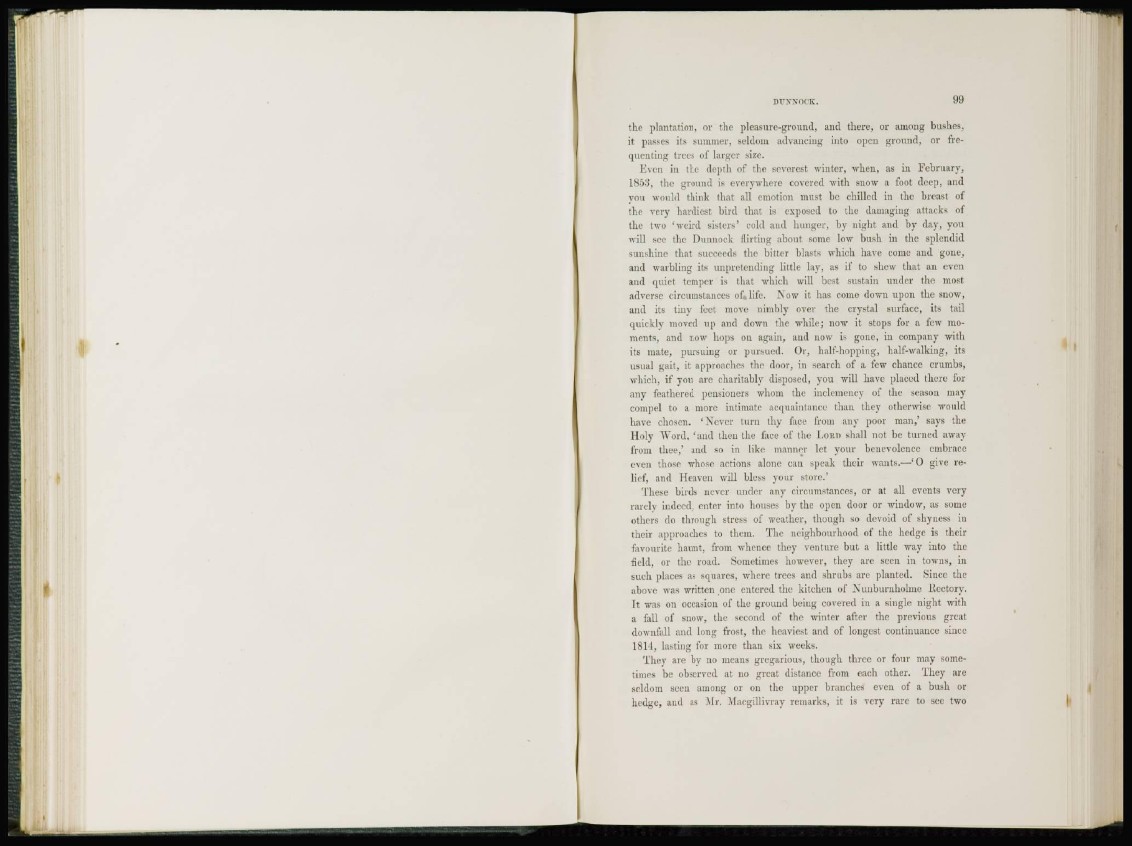
DUNNOCK. 99
the plantation, or the pleasure-ground, and there, or among bushes,
it passes its summer, seldom advancing into open ground, or frequenting
trees of larger size.
Even in the depth of the severest winter, when, as in February,
1853, the ground is everywhere covered with snow a foot deep, and
you would think that all emotion must be chilled in the breast of
the very hardiest bird that is exposed to the damaging attacks of
the two 'weird sisters' cold and hunger, by night and by day, you
will see the Dunnock flirting about some low bush in the splendid
sunshine that succeeds the bitter blasts which have come and gone,
and warbling its unpretending little lay, as if to shew that an even
and quiet temper is that which will best sustain under the most
adverse circumstances of* life. Now it has come down upon the snow,
and its tiny feet move nimbly over the crystal surface, its tail
quickly moved up and down the while; now it stops for a few moments,
and now hops on again, and now is gone, in company with
its mate, pursuing or pursued. Or, half-hopping, half-walking, its
usual gait, it approaches the door, in search of a few chance crumbs,
which, if you are charitably disposed, you will have placed there for
any feathered pensioners whom the inclemency of the season may
compel to a more intimate acquaintance than they otherwise would
have chosen. ' Never turn thy face from any poor man,' says the
Holy Word, 'and then the face of the LORD shall not be turned away
from thee,' and so in like manner let your benevolence embrace
even those whose actions alone can speak their wants.—'0 give relief,
and Heaven will bless your store.'
These birds never under any circumstances, or at all events very
rarely indeed, enter into houses by the open door or window, as some
others do through stress of weather, though so devoid of shyness in
their approaches to them. The neighbourhood of the hedge is their
favourite haunt, from whence they venture but a little way into the
field, or the road. Sometimes however, they arc seen in towns, in
such places as squares, where trees and shrubs are planted. Since the
above was written one entered the kitchen of N unburiiholme Hectory.
It was on occasion of the ground being covered in a single night with
a fall of snow, the second of the winter after the previous great
downfall and long frost, the heaviest and of longest continuance since
1814, lasting for more than six weeks.
They are by no means gregai'ious, though three or four may sometimes
be observed at no great distance from each other. They are
seldom seen among or on the upper branches even of a bush or
hedge, and as Mr. MacgilHvray remarks, it is very rare to see two